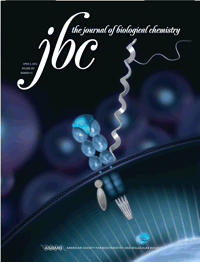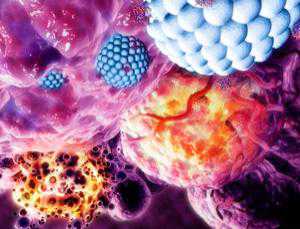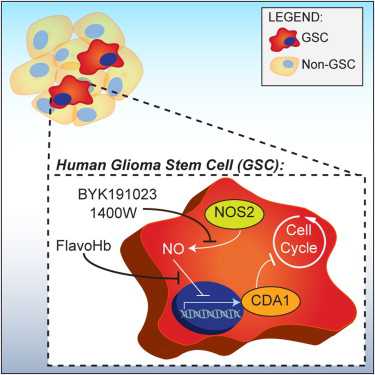Plos One:发现非小细胞肺癌的促进因子
2012-04-10 Deepblue 生物谷
在表观遗传学里,赖氨酸特异性脱甲基酶1(LSD1)的生化特征已经被鉴定,但是它的失调与肺癌的相关性还不可知。 近日,南京军区总医院肺癌综合诊治中心主任宋勇开展了关于一项关于肺癌的研究,该研究的目的在于评估非小细胞肺癌(NSCLC)患者LSD1表达的预后作用,并明确它在肺癌增生、迁移及入侵等过程中的确切功能。 来源于NSCLC患者外科切除标本的LSD1蛋白水平通过免疫组化(immunohisto

在表观遗传学里,赖氨酸特异性脱甲基酶1(LSD1)的生化特征已经被鉴定,但是它的失调与肺癌的相关性还不可知。
近日,南京军区总医院肺癌综合诊治中心主任宋勇开展了关于一项关于肺癌的研究,该研究的目的在于评估非小细胞肺癌(NSCLC)患者LSD1表达的预后作用,并明确它在肺癌增生、迁移及入侵等过程中的确切功能。
来源于NSCLC患者外科切除标本的LSD1蛋白水平通过免疫组化(immunohistochemistry)及蛋白印迹(Western blotting)被检测。LSD1的mRNA水平则通过qRT-PCR测出。
LSD1的表达与临床特征及预后的相关性由统计分析所确定,细胞增殖率通过MTS分析及免疫荧光检测被评估。细胞迁移及入侵通过划痕试验、基底膜侵袭实验及transwell侵袭小室试验检测。
结果表明,LSD1在肺癌组织中的表达高于正常肺组织,LSD1蛋白的过表达与NSCLC病人存活率的缩短有关。
LSD1主要定位于癌细胞核,使用siRNA或者化学抑制剂(如巴吉林,一种单胺氧化酶抑制剂,抗高血压药)来干扰LSD1,抑制了A549, H460及293T细胞的增生、迁移及入侵。
同时还发现,LSD1的过表达增强了细胞生长,LSD1还被发现调节了肺癌细胞由上皮到间质的转移。
LSD1的过表达与NSCLC的不良预后有关,促进了肿瘤细胞的增生、迁移和入侵。这些结果表明,NSCLC是一种肿瘤促进因子,这也对NSCLC的治疗提供了新的治疗靶点。相关论文发表在4月6日的Plos One。(生物谷Deepblue编译)

doi: 10.1371/journal.pone.0035065
PMC:
PMID:
Over-Expression of LSD1 Promotes Proliferation, Migration and Invasion in Non-Small Cell Lung Cancer
Tangfeng Lv, Dongmei Yuan, Xiaohui Miao, Yanling Lv, Ping Zhan, Xiaokun Shen, Yong Song.
Lysine specific demethylase 1 (LSD1) has been identified and biochemically characterized in epigenetics, but the pathological roles of its dysfunction in lung cancer remain to be elucidated.The aim of this study was to evaluate the prognostic significance of LSD1 expression in patients with non-small cell lung cancer (NSCLC) and to define its exact role in lung cancer proliferation, migration and invasion.The protein levels of LSD1 in surgically resected samples from NSCLC patients were detected by immunohistochemistry or Western blotting. The mRNA levels of LSD1 were detected by qRT-PCR.The correlation of LSD1 expression with clinical characteristics and prognosis was determined by statistical analysis. Cell proliferation rate was assessed by MTS assay and immunofluorescence. Cell migration and invasion were detected by scratch test, matrigel assay and transwell invasion assay.LSD1 expression was higher in lung cancer tissue more than in normal lung tissue. Our results showed that over-expression of LSD1 protein were associated with shorter overall survival of NSCLC patients.LSD1 was localized mainly to the cancer cell nucleus. Interruption of LSD1 using siRNA or a chemical inhibitor, pargyline, suppressed proliferation, migration and invasion of A549, H460 and 293T cells.Meanwhile, over-expression of LSD1 enhanced cell growth. Finally, LSD1 was shown to regulate epithelial-to-mesenchymal transition in lung cancer cells.Over-expression of LSD1 was associated with poor prognosis in NSCLC, and promoted tumor cell proliferation, migration and invasion.These results suggest that LSD1 is a tumor-promoting factor with promising therapeutic potential for NSCLC.
本网站所有内容来源注明为“梅斯医学”或“MedSci原创”的文字、图片和音视频资料,版权均属于梅斯医学所有。非经授权,任何媒体、网站或个人不得转载,授权转载时须注明来源为“梅斯医学”。其它来源的文章系转载文章,或“梅斯号”自媒体发布的文章,仅系出于传递更多信息之目的,本站仅负责审核内容合规,其内容不代表本站立场,本站不负责内容的准确性和版权。如果存在侵权、或不希望被转载的媒体或个人可与我们联系,我们将立即进行删除处理。
在此留言














#Plos one#
32
#非小细胞#
37